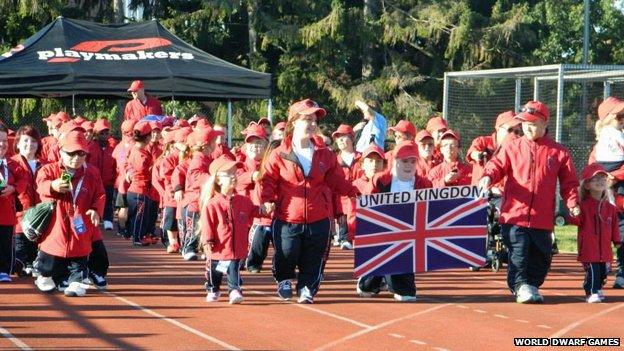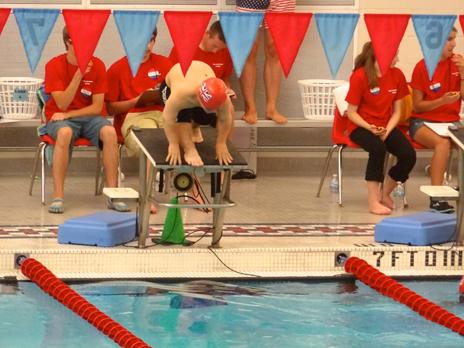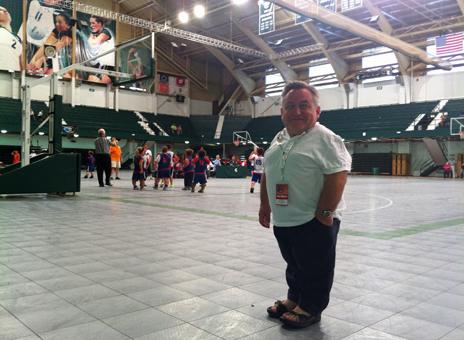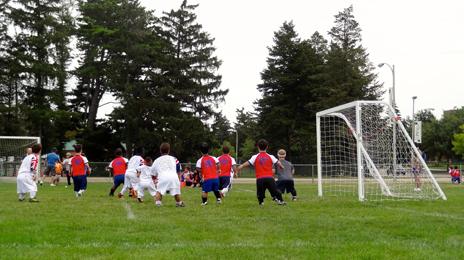Getting bigger: A view from the World Dwarf Games
- Published
- comments

The sixth World Dwarf Games is taking place in the US state of Michigan. Simon Minty - who has restricted growth - has travelled 4,000 miles to attend.
If you spend most of your life surrounded by people who are two feet taller than you, then a week in the company of people who are the same height can be both exhilarating and daunting.
This is my first time at the World Dwarf Games and I wasn't at all sure what I'd think of it.
With nearly 400 athletes from 17 nations competing, it's the largest sporting event in history exclusively for athletes with dwarfism.
I have restricted growth (or dwarfism) and stand at just under four feet (117cm) tall.
People of restricted growth are not all of the same size or physical ability and so, as in the Paralympics, athletes here are classified in terms of ability. There are three classifications and I'm somewhere in the mid-range - it's a rare and peculiar sensation to know that here I'm officially average.
Dwarfism is pretty loosely defined. Roughly speaking, if you are equal to, or under four feet 10 inches (147cm) and have a physical condition to accompany your smaller size, then you're probably in.
There are about 200 different types of dwarfism, and some are unique to the individual.
And it's not as if we're all the same height. People with dystrophic dwarfism, for instance, can be a foot taller (30 cm) than another. Even as someone with dwarfism, it's visibly arresting to see one athlete competing against another who is twice their height.

Here at the Games you can see, or compete in, more than 20 events. One of my favourites is the physically demanding basketball. It's played at a furious pace and the hoop remains - challengingly - at the standard height.
There's swimming, track and field, through to the more sedentary yet strategic boccia - a cross between lawn bowls and boules that you may have glimpsed at London 2012.
I confess I'm not competing, I'm here just as a supporter although I have been politely told by some that I have no excuse, because there is a big choice of events for differing abilities. Something for me to consider for the next games in 2017 then.

Simon Minty contemplates entering the 2017 games
The first competitive games for athletes with dwarfism started right here at the Michigan State University campus back in 1985. Back then it was as part of a wider disability games for those with cerebral palsy and those known as "les autres" (French for "the others") - a non-specific category you sometimes see in disability sport. It suggests we don't quite fit in anywhere else.
Things have moved on since then. The International Dwarf Athletic Federation was created in 1993 and dwarf athletes are part of the Paralympics. This has helped create stars like Great Britain's gold medal-winning swimmer Ellie Simmonds.
What is fantastic is seeing so many babies and youngsters with dwarfism here. At the opening ceremony it was remarked that the next generation of people with dwarfism will take it for granted that they can play sport and find a place to compete.
The primary purpose of the games is about sporting competition on a level playing field. But there's no doubt there are powerful secondary benefits. Apart from keeping people fit, when the tracksuit comes off there's a chance to meet and just "be".

It's great to speak with others at the same eye level. People whom you can naturally pat on the back in sympathy or throw your arms around in celebration. Not having to explain anything, nor have strangers gawp at you, is like having a week off from real life.
It's not all fluffy warm stuff though. There is serious competition. There are dedicated athletes who train very hard, make sacrifices, have to find sponsorship money, and travel great distances to get the chance to compete amongst peers. Many compete in multiple events.
Men's football, or soccer as it's called here, is perhaps the most keenly contested and talked about event at the games. Team GB are the current champs - they won gold at the last Games in Belfast 2009.
Team USA, not to mention Team Australia and Team Europe, want that to change. Different height, yes, but it's the same rivalries.
In one football match earlier this week, I saw two players collide when going for the ball. One of them was knocked off his feet. Before he hit the ground the opposing player stretched out his arm and caught him.
It was unusual behaviour in competitive sport and it felt like it really was the taking part that was most important.
But while watching later football heats I changed my mind. Team USA scored against Team GB and I felt an immediate ache in my stomach.
Feeling sick that my country's team had conceded a goal, I realised I'm hooked, and that for many reasons, these games really do matter.
You can follow Ouch on Twitter, external and on Facebook, external, and listen to our monthly talk show